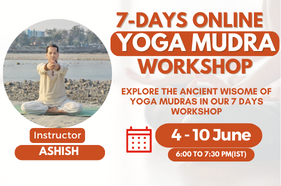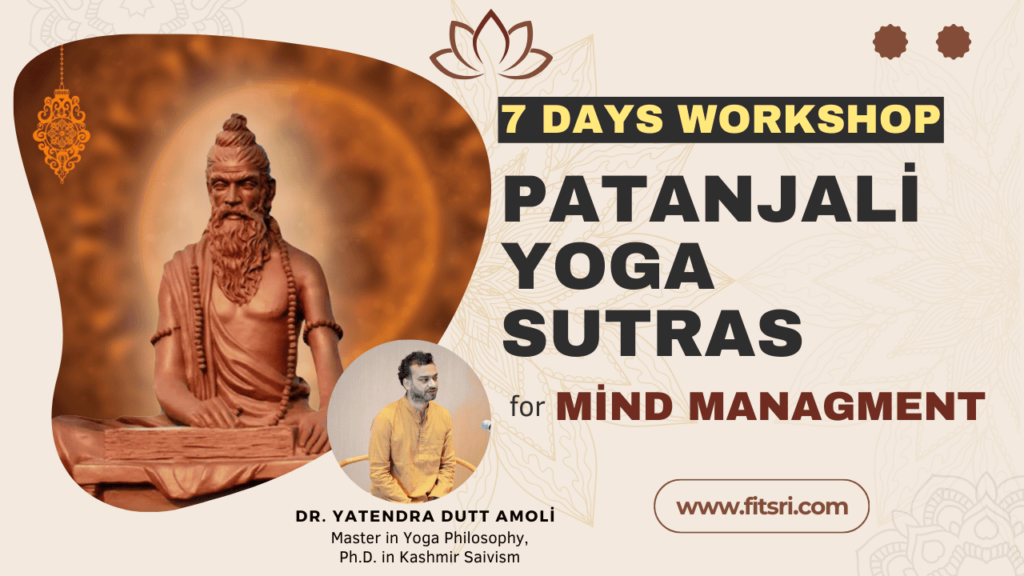
The Yoga Sutras of Patanjali is a timeless guide to understanding the mind and achieving inner peace. It explores the nature of consciousness, the causes of mental turmoil, and the path to self-realization through discipline and mindfulness.
In this workshop, we focus on the profound teachings of the Yoga Sutras related to mind management. You’ll gain practical insights into the workings of the mind, learn techniques to overcome distractions and mental obstacles, and discover how to cultivate inner stillness in everyday life. This workshop is designed to help you take your first steps toward a calmer, more focused, and balanced mind.
About the Workshop
This 7-day online workshop is an immersive journey into the essence of the Yoga Sutras of Patanjali, focusing on the art of mind management. Each session is carefully designed to build your understanding of foundational concepts like Chitta (mind), Vrittis (mental modifications), and Kleshas (afflictions) before diving into practical techniques to overcome distractions and cultivate mental clarity.
With 1-hour live sessions each day, this workshop blends philosophy and practicality, offering a structured learning experience for yoga practitioners, meditators, and anyone seeking mental peace. You’ll explore core teachings from the Sutras, gain actionable insights, and practice techniques that can transform how you manage your mind and emotions.
Each day’s curriculum is designed to ensure an engaging and impactful experience.
Day 1: Foundations of the Mind (Chitta and Vrittis)

On the 1st day of workshop, you will understand the Mind in the language of Yoga Sutras. It will focused on Chitta (mind-stuff) and Its Modifications.
Key concepts included in day 1 session are:
- Introduction to Yoga Sutras and their relevance today.
- What is Chitta (mind-stuff)?
- Understanding Vrittis (modifications of the mind) – Sutra 1.2 (Yoga Chitta Vritti Nirodha).
- Types of Vrittis – Correct knowledge, misconception, imagination, deep sleep, and memory (Sutras 1.5–1.11).
- Practical takeaway: Identifying your Vrittis through introspection.
Day 2: The Obstacles to Mental Clarity
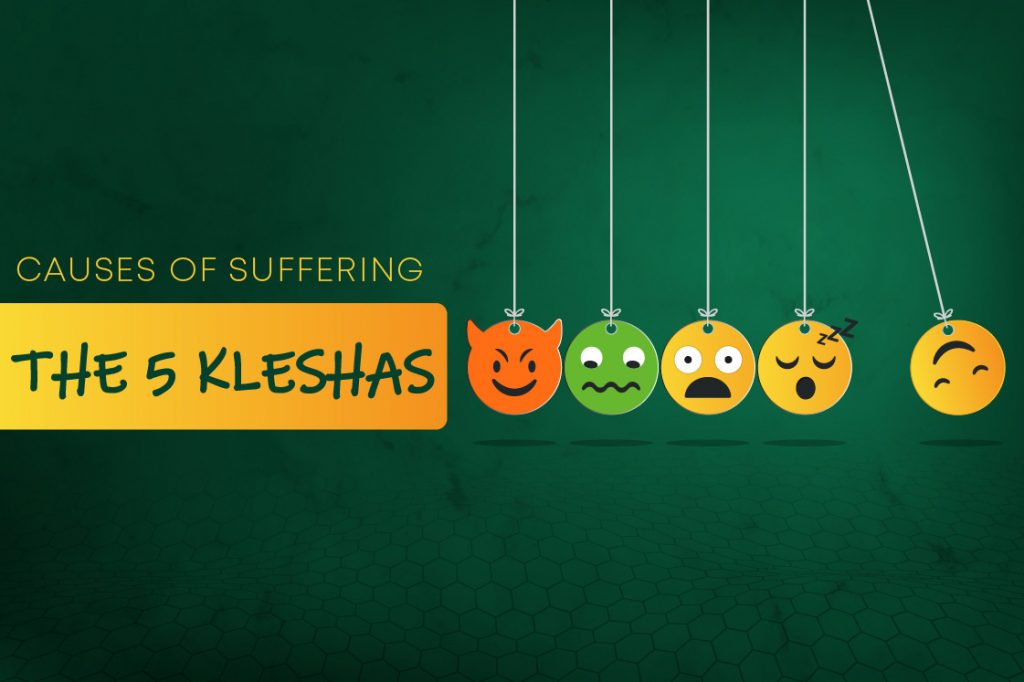
According to the Yoga Sutras, it is the Kleshas (afflictions) that cause suffering and prevent you from experiencing inner peace. On Day 2, you will explore the causes of mental turmoil and how to overcome them.
Key concepts include:
- Introduction to Kleshas (afflictions) – Sutra 2.3 (Avidya, Asmita, Raga, Dvesha, Abhinivesha).
- How these obstacles create suffering and bind us to mental turmoil.
- Sutra 2.11: Removing the obstacles through meditation and mindfulness.
- Practical takeaway: Recognizing Kleshas in daily life and applying mindful strategies to overcome them.
Day 3: Tools for Mind Management: Abhyasa and Vairagya

The Yoga Sutras emphasize that the mind can be mastered through two key principles: Abhyasa (consistent practice) and Vairagya (detachment). On Day 3, you will learn how these twin pillars can help you cultivate focus, develop mental resilience, and maintain inner balance in your daily life.
Key concepts include:
- The twin pillars of mind management: Abhyasa (consistent practice) and Vairagya (detachment) – Sutras 1.12–1.16.
- What is effective Abhyasa? Qualities of practice (Sutra 1.13–1.14).
- What is Vairagya? Types of detachment.
- Practical takeaway: Incorporating these principles into personal and professional life for better focus and peace.
Day 4: Dealing with Distractions and Obstacles

The Yoga Sutras identify distractions and obstacles as barriers to mental clarity and focus. On Day 4, you will explore the nature of these distractions, learn techniques like Pratipaksha Bhavana (cultivating opposite thoughts), and discover ways to overcome mental agitation for a steadier and more peaceful mind.
Key concepts include:
- Distractions of the mind (Antarayas) and their consequences (Vikshipta Chitta) – Sutras 1.30–1.31.
- Cultivating a steady mind through one-pointed focus (Ekagrata).
- Introduction to Pratipaksha Bhavana (opposite thinking) – Sutra 2.33.
- Practical takeaway: Handling negative emotions and developing inner stability.
Day 5: The Nature of Inner Peace: Towards Samadhi

The ultimate goal of the Yoga Sutras is achieving Samadhi—a state of inner stillness and self-realization. On Day 5, you will delve into the stages of Samadhi, understand how it leads to the experience of your true self, and explore meditation techniques inspired by these profound teachings.
Key concepts include:
- What is Samadhi? Understanding the highest states of mental stillness – Sutras 1.17–1.18.
- Moving through the stages of Samadhi: Savitarka, Savichara, Sananda, and Sasmita.
- Sutra 1.3 (Tada Drashtuh Swarupe Avasthanam): Experiencing your true nature.
- Practical takeaway: Cultivating inner peace through meditation practices inspired by the Sutras.
Day 6: The Role of Discipline in Mind Management
The Yoga Sutras emphasize the importance of ethical living as the foundation for mental clarity and inner harmony. On Day 6, you will explore the principles of Yama and Niyama (ethical guidelines), understand their role in mind management, and learn how to integrate these practices into your daily life for lasting peace.
Key concepts include:
- Introduction to Yama and Niyama (ethical guidelines) – Sutras 2.30–2.32.
- How these principles support mental clarity and reduce distractions.
- Sutra 2.35: The power of non-violence (Ahimsa) on the mind and society.
- Practical takeaway: Integrating ethical living into your yoga and life practice.
Day 7: Integrating the Teachings of the Yoga Sutras
The Yoga Sutras provide a comprehensive blueprint for achieving freedom from mental conditioning and living with clarity and purpose. On Day 7, you will review the key teachings covered throughout the workshop, explore advanced concepts like Pranayama (breath regulation) and liberation (Kaivalya), and learn how to apply these timeless principles to modern challenges.
Key concepts include:
- Recap of the key Sutras covered during the workshop.
- Sutra 2.50: Role of breath regulation (Pranayama) in mind management.
- Sutra 4.29: Attaining freedom from mental conditioning.
- Group discussion: How to apply these teachings in modern challenges.
- Final meditation to experience Chitta Vritti Nirodha.
Meet Workshop Teacher
Dr. Yatendra Dutt Amoli
PhD in Kashmir Saivism Yoga, ICCR chair for India China Yoga College, and cultural anthropology expert
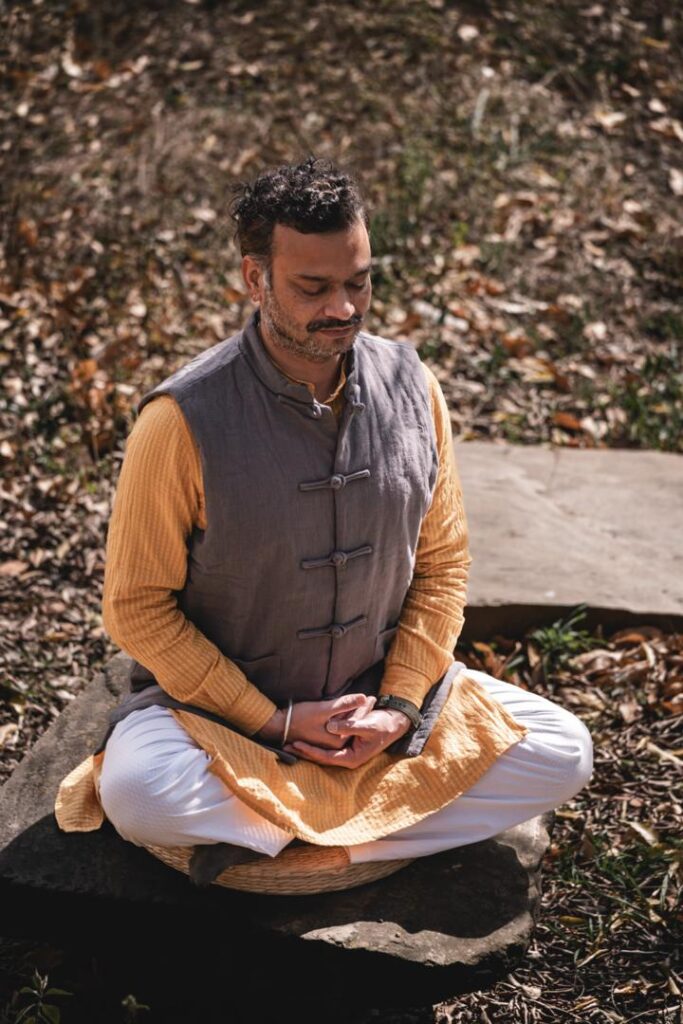
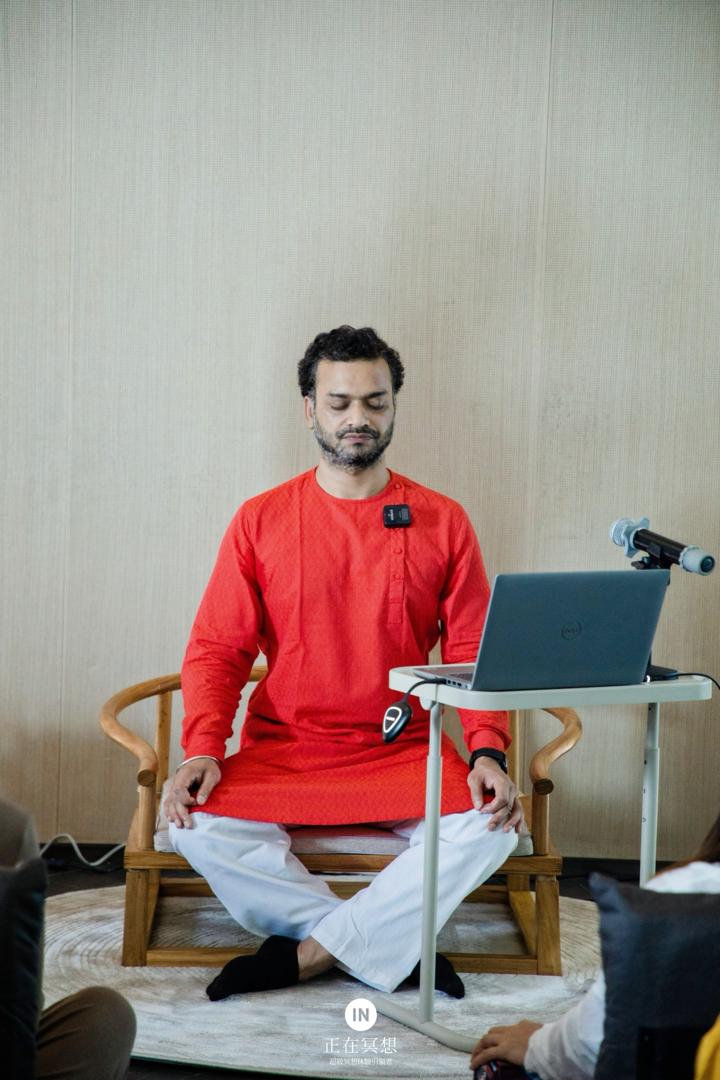
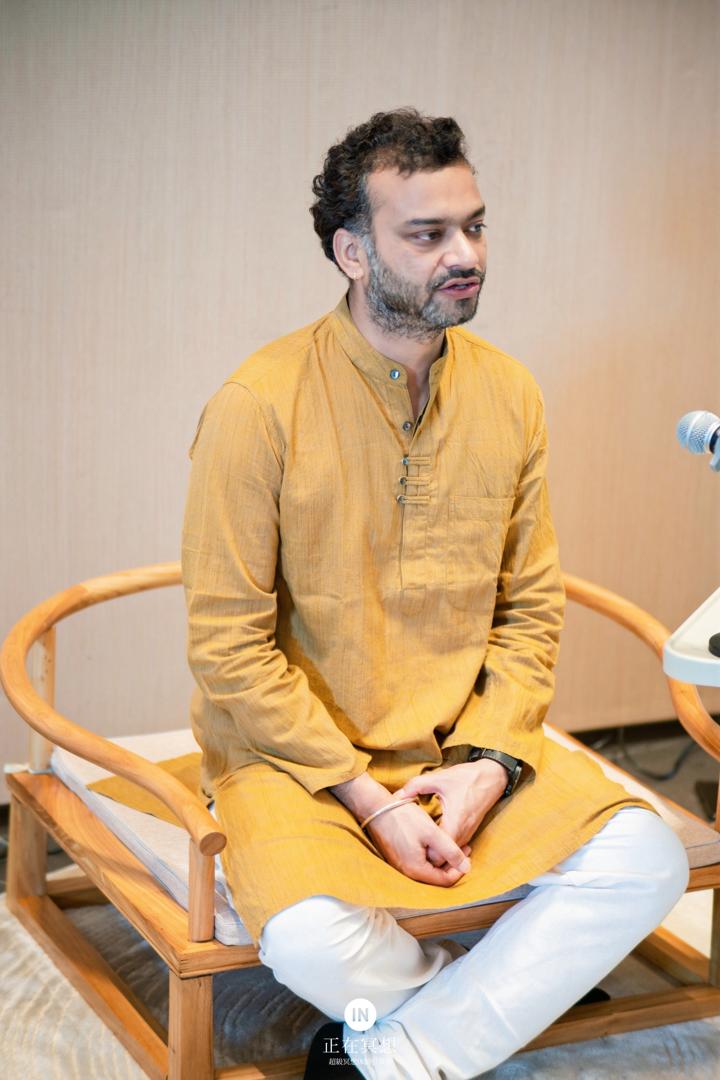
Dr. Yatendra Dutt Amoli earned his PhD in Yoga, specializing in Kashmir Saivism—a rare cult of Tantra Philosophy. Over 15 years of teaching and academic experience, he has authored several research papers published in international journals. His book on Kashmir Shaiva Philosophy “Yoga in Kashmir Saivism” was published by the esteemed Chaukhamba Surbharati Prakashan in India.
He has contributed major articles to Yoga Journal’s China editions. His interviews have been broadcasted by CGTN, CCTV, and other national televisions in China. Appointed as an ICCR chair by the MEA Government of India, he played a crucial role in establishing the first India China Yoga College at YMU, Kunming in 2015.
Currently serving as Associate Professor and Director at India China Yoga College South West Branch in Kunming, China, he is actively involved in translation and research works of cultural anthropology in China and India. With a profound understanding of Sanskrit literature related to the cultural investigation of Yoga, he is also working on some rare Yoga texts. His talks on Hatha Yoga and other major systems have been recorded by IIT (R).
 As featured in
As featured in








7-Days Yoga Sutra Workshop Details
| Date | 23 Feb to 1st March 2025 |
| Time | 6:00 pm to 7:00 pm (IST) / 7:30 am to 8:30 am (EST) / 6:30 am to 7:30 am (CST) |
| Medium | Zoom meeting |
| Number of sessions | 7 interactive classes, each day 1 session about 1 Hour. Recordings are available in case one missed any live sessions or can’t attend a live workshop. |
| Discounted Workshop Fee | ₹5999 $119 |
Book Your Spot Now
- 7+ hours learning
- Recordings Available to watch later
$119 / ₹5999
Frequently Asked Questions (FAQs)
Who is this workshop suitable for?
This workshop is perfect for anyone interested in understanding the mind from a deeper, yogic perspective. Whether you’re a yoga practitioner, meditator, or someone seeking mental clarity, this workshop is designed to offer practical insights for all levels.
Do I need prior experience with the Yoga Sutras to attend?
No prior experience is necessary! This workshop is suitable for both beginners and those with some knowledge of the Yoga Sutras. We start with the basics and build up progressively each day.
Can I attend if I cannot join the live sessions?
Yes! All sessions will be recorded, so you can watch them at your convenience. However, we recommend attending the live sessions for an interactive experience and to ask any questions you may have.
What if I have questions during the workshop?
Feel free to ask questions during Q&A sessions after each live class, or you can reach out via email or our community platform if you have any queries. We’ll be happy to assist you!
Will I have lifetime access to the recorded sessions?
The recorded sessions will be available for 1 week after the workshop. We encourage participants to download the recordings during this time to watch them later at their convenience.

